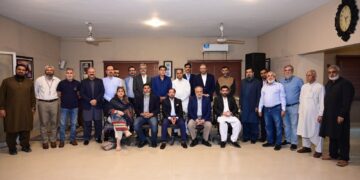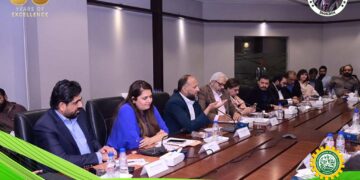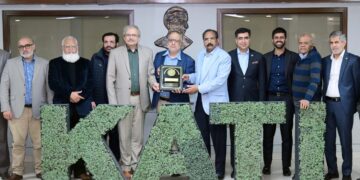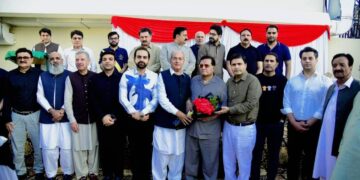Islamabad : Former prime minister, Shahid Khaqan Abbasi, has strongly urged the Shehbaz Sharif-led new federal government to urgently implement the agenda of privatisation, particularly in the energy sector as the greater involvement of the private sector is key to overcoming serious national economic woes.
The former PM was addressed as the chief guest at the inaugural session of the 16th CSR Summit and Awards-2024 organised by the National Forum for Environment and Health (NFEH) here at a hotel on Wednesday. On the occasion, 77 companies were given awards for their outstanding philanthropic work in the last year for the welfare of the deprived communities in the country.
While eulogising the role of private companies in the uplift of underprivileged communities, the former PM said that privatisation was the only way forward for the new government to overcome the economic crisis as the rulers and bureaucracy couldn’t ingeniously run the economy as per the requirements of the present day world.
He said that energy sector problems massively accounted for the current economic crisis as the agenda of privatisation should be implemented without any further delay to resolve these issues.
Abbasi was of the view that privatisation should be carried out in the energy sector in a speedy manner to save it from sheer bankruptcy.
He said the power and energy sector companies unable to clear their liabilities for long against the electricity, oil, and gas they purchased had already gone bankrupt.
He urged the new federal government to urgently roll out the agenda of privatisation of the loss-making distribution companies in the power sector whose ownership shouldn’t remain with the state any more.
The former PM said that precedent was available to the government in the form of Karachi Electric, which as a DISCO was being efficiently run after privatisation. Other DISCOs should be privatised in the same manner, he said.
Abbasi said that without privatisation the massive issue of circular debt involving trillions of rupees couldn’t be resolved.
He lamented that the bureaucracy in Pakistan couldn’t implement such market-driven modern solutions to save the national economy as the bureaucrats were still reliant on decades-old administrative options that don’t work anymore.
The former PM said that political stability, rule of law and constitution, and free and fair elections were the prerequisites for stabilising the economy.
Speaking as the guest of honour, Ambassador of Denmark to Pakistan, Jakob Linulf, shared with the audience the Danish success story of effectively tapping renewable energy sources in the country to decrease its reliance on fossil fuels for power production.
He informed the audience that Danish companies took with them the same vision of protecting the environment and fighting the issue of climate change when they went overseas to do business.
He said the Danish companies stood for protecting the health of employees and their families in the best possible manner in pursuance of their CSR principles.
The Danish Ambassador said the companies from Denmark also did their best to promote the cause of women’s empowerment as they were equal opportunity employers no matter where they operate in the world.
He urged the award-winning companies to continue with their exemplary philanthropic work in the education, health, environment, climate change, women empowerment, community uplift, and poverty alleviation areas for the progress of Pakistan.
Speaking as the other guest of honour, the High Commissioner of Sri Lanka in Pakistan, Admiral Ravindra C Wijegunaratne, informed the audience about the massive global welfare initiative launched by the Sri Lankan nation by donating their eye cornea after death to restore the vision of blind people around the world.
He said that out of 88,000 eye cornea donated by people of Sri Lanka, some 35,000 were used to benefit Pakistani people having impaired vision showing the strong bond between the two countries.
He said that a 38,000-strong workforce was available in Sri Lanka comprising doctors, para-medical staff, and volunteers to safely perform the cornea donation will of the deceased Sri Lankans.
He appreciated the unwavering support Sri Lanka received from Pakistan during its years-long deadly civil war that went a long way in keeping his country intact.
Speaker of Azad, Jammu & Kashmir Legislative Assembly, Chaudhry Latif Akbar, said the CSR initiatives by the corporate sector could go a long way in promoting the causes of community uplift, poverty alleviation, environmental protection, and slowing down the phenomenon of climate change to serve the needy people in Azad Kashmir.
He lamented that several banks despite having very profitable operations in Azad Kashmir didn’t do any CSR project for the welfare of impoverished Kashmiri people.
He said the CSR initiatives should address the issues of deforestation, environmental damage, and climate change that have threatened the survival and livelihoods of vulnerable communities in the hilly north of Pakistan.
MNA, Nafisa Shah, called for the adoption of a legal framework to formalise CSR initiatives in Pakistan.
She assured the audience that the relevant standing committees of the new house of the National Assembly would hold formal hearings to encourage and promote CSR work in Pakistan.
NFEH President, Naeem Qureshi, said the CSR summit organised every year went a long way in promoting the causes of community uplift, reforestation, poverty alleviation, skill development, healthcare, and educational projects for the deprived people in Pakistan.
He urged the corporate sector to combine their CSR resource and initiatives to serve the underprivileged communities in the best possible manner.



















